What Is Financial Discovery And How Does It Affect Your Connecticut Divorce?
Discovery is the process of gathering the financial information necessary to handle a divorce case. Your attorney will send discovery requests to the other party soon after the divorce complaint and answer are filed.
Mandatory Discovery
In a Connecticut divorce, each party is required to disclose financial information through what is called mandatory discovery. The documents requested during mandatory discovery include:
- Federal and state tax returns from the last three years; this includes returns from any businesses in which a party has an interest
- Income-related IRS forms like W-2, 1099 or K-1 from the last three years
- Proof of income through copies of all pay stubs or other applicable earnings records from the last year
- Bank statements from any account maintained individually or jointly from the last 24 months
- IRA, pension plans or any retirement account information
- Life insurance policies
- Other relevant financial documents
The Financial Affidavit
Connecticut also requires a financial affidavit. This is a statement that you and your attorney will prepare, which details your income and expenses. It looks a lot like a household budget; it gives information about bills and financial obligations, and also names all assets or sources of income. This gives the parties and the judge a useful financial snapshot.
Interrogatories
Interrogatories are a list of detailed questions that an attorney may send the other party. The other party must answer the questions truthfully and to the best of their ability. It is essentially an interview of the party conducted through a written document. Interrogatories are due 30 days after they are received unless there is a good reason to apply for an extension of time.
Depositions
A deposition is an opportunity to get sworn testimony from a party or any person who has knowledge that may be needed as evidence during the divorce proceedings. The deposition is much like sitting on the witness stand, but there is no judge present. Attorneys still make objections, which are noted on the record by the court reporter who documents the deposition word for word creating a transcript. The transcript will be made available to both parties, as well as to the judge or any court officers presiding over the case. Some people get nervous about depositions, but your lawyers will help you know what to expect and will be by your side.
We Handle Discovery With Care
Contact the Connecticut family law attorneys at the LAW OFFICES OF PIAZZA & SIMMONS, LLC, with questions about the financial discovery process in your Connecticut divorce. Call our office today at 203-936-6772.
1https://www.jud.ct.gov/lawlib/Notebooks/Pathfinders/FamilyDiscovery.pdf
2https://www.jud.ct.gov/webforms/default.aspx?load_catg=Family#searchTable

